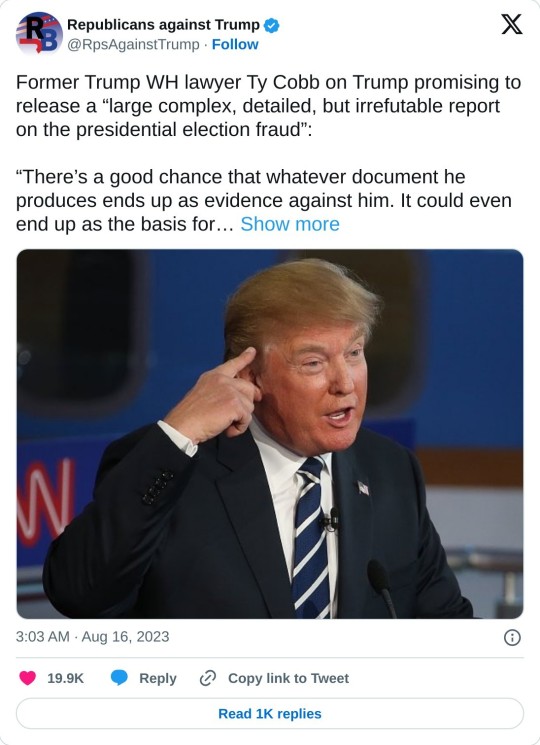#ty cobb
Text

Group portrait of Detroit Tigers with batboy and dog. Printed on front: "American League Champions, 1907 [sic]." Typed on label on back: "Detroit 'Tigers', 1905. Left to right, top row: Donovan, Disch, Lindsay, Doran, McIntyre, Eubanks, Mullin. Middle row: Lowe, Drill, Killian, Crawford, Armour (mngr.), Wiggs, Cobb, Barrett, O'Leary. Bottom row: Kitson, Warner, Coughlin, Schaefer."
Ernie Harwell Sports Collection, Detroit Public Library
#detroit tigers#1907#detroit#tigers#baseball#baseball history#ty cobb#detroit history#detroit public library
39 notes
·
View notes
Text


Buster Keaton and Ty Cobb - 1922
#buster keaton#ty cobb#1920s#silent film#silent comedy#silent cinema#silent movies#silent era#film#comedy#cinema#movies#pre code#pre code hollywood#pre code film#damfino#damfinos#old hollywood#vintage hollywood#black and white#slapstick#1922
72 notes
·
View notes
Text

600+ Rare Century-Old Baseball Cards Found in Old Tobacco Tin
The collection includes a unique variety of vintage Babe Ruth cards and hundreds of rare baseball Hall of Famers.
A California man said he stumbled upon every baseball fans’ dream when he found an old tobacco tin at his father’s home.
According to a press release by Auction Monthly, a California-based company that evaluates and consigns sports memorabilia, a treasure trove of more than 600 cards “were discovered in a closet by a Northern California resident cleaning out his father's home” and are “some of the rarest vintage baseball cards from the 1920's.”
The post-World War I era cards will be available in an upcoming sale on the company’s website.



The early 1900's Pedro Cut Plug Tobacco tin was filled with "many different types of pre-war baseball cards from the 1920's era including strip baseball cards from 1919 to 1923 and rare 1924-26 Zeenuts cards that were distributed on the West Coast."
Some of the discovered cards of baseball legends include:
1919-21 W514 'Shoeless' Joe Jackson
Nearly every player from the iconic 1919 'Black Sox' team
1921 E220 National Caramel Babe Ruth
1922 American Caramel E121 Babe Ruth
1919-21 Babe Ruth W514
1920 W519 Babe Ruth
Ty Cobb 1922 American Caramel E121
1921 W516 Ty Cobb
1920 W519 George Sisler
According to the statement, the 'Shoeless' Joe Jackson card is "a very rare find." Jackson, a career .356 hitter, was part of the Black Sox scandal in 1919. He was one of eight Chicago White Sox players banned for life for allegedly throwing the 1919 World Series.

#600+ Rare Century-Old Baseball Cards Found in Old Tobacco Tin#baseball#baseball cards#collectable cards#collectables#babe ruth#ty cobb#'shoeless' joe jackson#1919 'black sox' team#history#history news#rare#antique
20 notes
·
View notes
Text
When Donald Trump formally declares his 2024 candidacy, he won’t just be running for another term in the White House. He’ll be running away from legal troubles, possible criminal charges, and even the specter of prison time.
In recent months, Trump has made clear to associates that the legal protections of occupying the Oval Office are front-of-mind for him, four people with knowledge of the situation tell Rolling Stone.
Trump has “spoken about how when you are the President of the United States, it is tough for politically motivated prosecutors to ‘get to you,'” says one of the sources, who has discussed the issue with Trump this summer. “He says when [not if] he is President again, a new Republican administration will put a stop to the [Justice Department] investigation that he views as the Biden administration working to hit him with criminal charges — or even put him and his people in prison.”
Presidential immunity and picking his own Attorney General aren’t Trump’s only reasons for running again. And as he works on another run, Trump is in a tug-of-war with leaders and operatives of his own party about when to announce, according to multiple people with knowledge of the matter.
The former-President is motivated to announce early — even before Election Day 2022 — in the hopes of clearing the field of primary rivals. But GOP leaders, including some of Trump’s closest advisors, don’t want him to declare his intentions until after the midterm elections. The GOP wants to keep voters focused on President Joe Biden, rather than transforming the contest into a referendum on Trump. In recent months, Trump has reluctantly agreed to hold off, only to return shortly thereafter with threats to make an early announcement, either out of self-interest, spite, or some combination of the two.
But as Trump talks about running, the four sources say, he’s leaving confidants with the impression that, as his criminal exposure has increased, so has his focus on the legal protections of the executive branch.
It’s not just liberal wish-casters or Trump critics who are acknowledging the former-President’s legal jeopardy. Trump’s teams of lawyers and former senior administration officials speak about it commonly. “I do think criminal prosecutions are possible…for Trump and [former-White House Chief of Staff Mark] Meadows certainly,” Ty Cobb, a former top lawyer in Trump’s White House, bluntly told Rolling Stone late last month.
Trump himself seems to acknowledge potential problems. He “said something like, ‘[prosecutors] couldn’t get away with this while I was President,’” another one of the four sources recalls. “It was during a larger discussion about the investigations, other possible 2024 [primary] candidates, and what people were saying about the Jan. 6 hearings … He went on for a couple minutes about how ‘some very corrupt’ people want to ‘put me in jail.’”
The powers of the presidency would offer a welcome pause to the various civil suits and criminal investigations now hanging over Trump. It’s unclear whether the Justice Department will charge Trump in connection with fomenting the January 6 insurrection, but winning the White House would be extremely helpful to him. Department policy forbids the prosecution of a sitting President, effectively insulating Trump from any federal charges for another four years.
The law is less clear on whether a President can face prosecution from states while in office, but any attempt to put Trump on trial in a state case would likely be litigated in the Supreme Court. Former New York City district attorney Cyrus Vance’s efforts to subpoena Trump’s tax returns landed before the high court in 2020.
At the state level, Trump faces two criminal investigations. In Manhattan, district attorney Alvin Bragg empaneled a grand jury to investigate whether the former-President committed fraud by allegedly lying about the value of his assets in financial statements. The grand jury has since expired, however, and there are few indications that Bragg intends to bring charges. In Georgia, prosecutors in Fulton County are investigating whether Trump illegally interfered in the counting of votes by pressuring Secretary of State Brad Raffensperger to “find” votes for him after the election. Just this month, Fulton County district attorney Fani Willis has subpoenaed Trump allies Rudy Giuliani and Sen. Lindsay Graham and sent letters to pro-Trump Georgia state senators warning they could be prosecuted as part of the case.
Trump faces a slew of lawsuits, both for his conduct while in office and before. In previous cases Trump’s attorneys have claimed that the Office of the President makes him immune to civil suits while sitting. That was Trump’s defense in a since-dismissed lawsuit by former Apprentice contestant Summer Zervos.
In the 1990s, Paula Jones’ suit against then-President Clinton established that Presidents do not enjoy absolute immunity. But the Zervos suit against Trump dragged on for five years before she dropped it. The case demonstrated that the Presidency can help delay civil suits, even if it’s not an insurmountable obstacle.
Trump’s most recent legal headaches stem from his role in inciting the Jan. 6 insurrection. Capitol and Washington, D.C. Metropolitan police officers have sued Trump over the physical and emotional damages they suffered during the rioting. The former-President also faces two separate suits from Democratic members of Congress. The suits accuse the President of violating their civil rights by conspiring with extremist groups such as the Proud Boys and Oath Keepers to prevent the count of electoral votes.
E. Jean Carroll is still pursuing a case against Trump for defamation. She has accused Trump of raping her in a store in the mid 1990s and is suing over his 2019 claim that Carroll was “totally lying.” The Justice Department, under both Trump and Biden, has claimed that Trump is immune from the suit because he was “acting within the scope of his office” when he made the claims. A federal appeals court is currently weighing the Department’s arguments.
And in New York, Attorney General Letitia James is pursuing a civil investigation into whether the Trump Organization lied about the value of its assets.
The suits add to mounting pressure on Trumpworld as the Jan. 6 Committee and Justice Department investigations have heated up. A number of Trump aides have been pulled into a federal grand jury investigation into the effort to overturn Joe Biden’s 2020 election victory. The investigation has yielded search warrants served on Trump campaign attorney John Eastman and Justice Department and former acting Assistant Attorney General Jeffrey Clark.
In the face of the investigations, many in Trumpworld have hoped that former aides could face prosecution for the efforts to overturn the election instead of the former-President. In particular, Trump associates have tried to distance him from Eastman. And as Rolling Stone reported last week Trump’s legal advisors also view former-Chief of Staff Mark Meadows as a potential fall guy for the former-President’s post-election activities.
#us politics#news#donald trump#2024 election#2022#2022 elections#rolling stone#department of justice#biden administration#mark meadows#Ty Cobb#Cyrus Vance#Alvin Bragg#Brad Raffensperger#Fani Willis#Rudy Giuliani#sen. lindsey graham#Summer Zervos#the apprentice#Paula Jones#president bill clinton#E. Jean Carroll#Letitia James#John Eastman#Jeffrey Clark
116 notes
·
View notes
Photo

113 notes
·
View notes
Photo
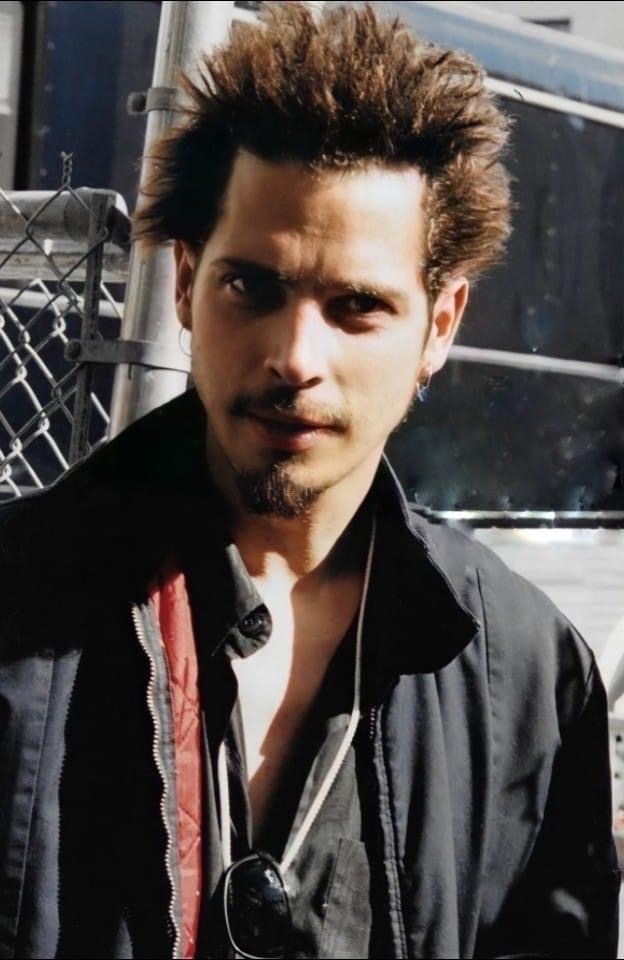
In the past year, Soundgarden have been in the studio full time, recording Down on the Upside. With songs written by all four band members, this new album is a touch heavier than their last. Witness "Ty Cobb," a speeded up, noisy number with the chorus "Hard headed fuck you all," and "No Attention," a reaffirmation of the punk rock attitude. "It's about ignoring useless advice," says Cornell, who wrote the song. Which begs the question: Is there such a thing as useful advice? "Barely," he says. "When you're 6 years old, there probably is. But you end up not understanding it until you learn it yourself. When I was 2, I pulled an iron down on my arm. I'm sure my mom told me to stay away from it. But it didn't do any good because I didn't know what an iron was."
US Magazine, July 1996
(via @lovehate-love)
#soundgarden#chris cornell#ty cobb#no attention#down on the upside#down on the upside era#i love how intelligent and badass he is#that's all#🥰💋🔥#❤️❤️❤️#short-haired chris was beautiful#hq pics
29 notes
·
View notes
Text

[138] why not smile?
#don't blink#honus wagner#pittsburgh pirates#stan musial#st louis cardinals#ty cobb#atlanta braves#baseball#mlb#a softer world remix
9 notes
·
View notes
Text
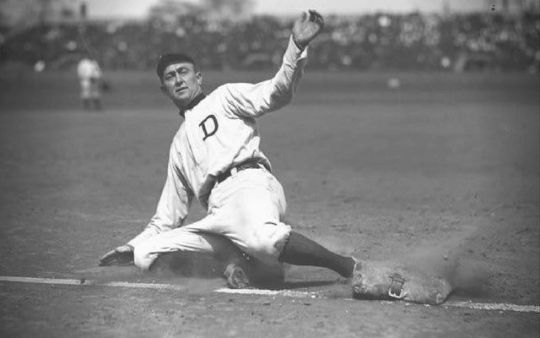
Ty Cobb may have been history's scariest baseball player, and if he had gotten just one World Series under his belt, we would probably regard him as the greatest ever as well.
#Ty Cobb#Detroit Tigers#baseball#MLB#classic sports#vintage#sliding#sports photography#black and white#bad boy
2 notes
·
View notes
Text

Ty Cobb instructs young Hank Aaron
2 notes
·
View notes
Text
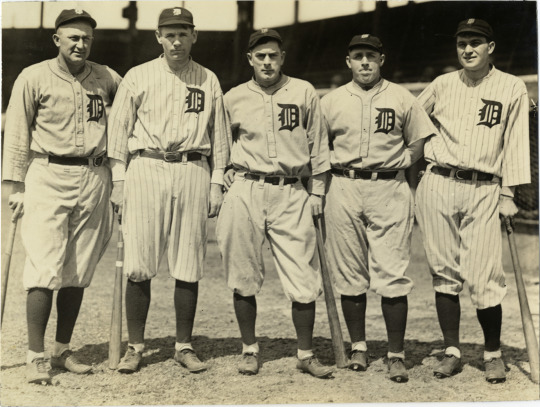
Ty Cobb, Harry Heilmann, Bobby Veach, Bob Fothergill, and Heinie Manush standing on field. Wearing a mix of home and road uniforms. Typed on label on back: "'Tiger' outfield, 1923. L to R: Cobb, Heilmann, Veach, Fothergill, and Manush."
Ernie Harwell Sports Collection, Detroit Public Library
#detroit tigers#tigers#baseball#detroit#detroit history#1923#ty cobb#harry heilmann#bobby veach#bob fothergill#heinie manush#detroit public library
47 notes
·
View notes
Text

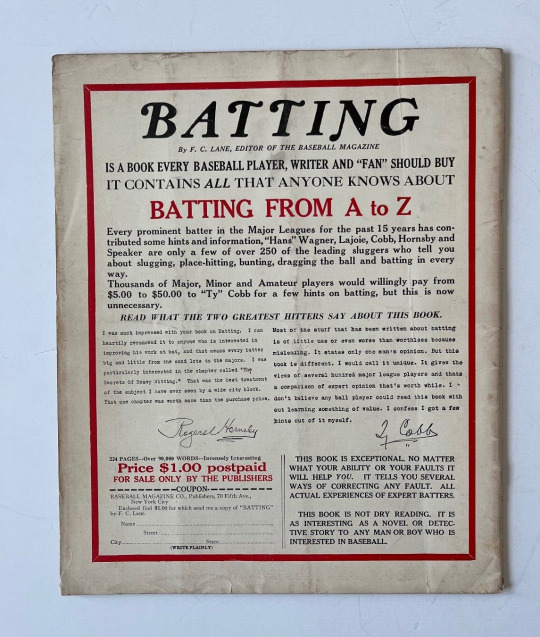
Baseball Magazine of December, 1926 featuring Hall of Fame sluggers Babe Ruth and Rogers Hornsby on the cover (via Ebay.)
#Baseball#1920s#Baseball Magazine#Babe Ruth#Rogers Hornsby#World Series#Slugger#Hall of Fame#Ty Cobb#Honus Wagner#Batting#Hitting#Vintage#Antique#Old Magazines#America's Pastime
3 notes
·
View notes
Text
Tyrus Raymond Cobb (December 18, 1886 – July 17, 1961)

youtube
Rare Ty Cobb video- hitting, running, stealing, and swing
Ty Cobb "the Georgia Peach"
5 notes
·
View notes
Text
Please, Lord, make it so!
19 notes
·
View notes
Text
Trump and allies plot revenge, Justice Department control in a second term | The Washington Post
ADVISERS HAVE ALSO DISCUSSED DEPLOYING THE MILITARY TO QUELL POTENTIAL UNREST ON INAUGURATION DAY. CRITICS HAVE CALLED THE IDEAS UNDER CONSIDERATION DANGEROUS AND UNCONSTITUTIONAL.
By Isaac Arnsdorf, Josh Dawsey and Devlin Barrett
Donald Trump and his allies have begun mapping out specific plans for using the federal government to punish critics and opponents should he win a second term, with the former president naming individuals he wants to investigate or prosecute and his associates drafting plans to potentially invoke the Insurrection Act on his first day in office to allow him to deploy the military against civil demonstrations.
In private, Trump has told advisers and friends in recent months that he wants the Justice Department to investigate onetime officials and allies who have become critical of his time in office, including his former chief of staff, John F. Kelly, and former Attorney General William P. Barr, as well as his ex-attorney Ty Cobb and former Joint Chiefs of Staff chairman Gen. Mark A. Milley, according to people who have talked to him, who, like others, spoke on the condition of anonymity to describe private conversations. Trump has also talked of prosecuting officials at the FBI and Justice Department, a person familiar with the matter said.
In public, Trump has vowed to appoint a special prosecutor to “go after” President Biden and his family. The former president has frequently made corruption accusations against them that are not supported by available evidence.
To facilitate Trump’s ability to direct Justice Department actions, his associates have been drafting plans to dispense with 50 years of policy and practice intended to shield criminal prosecutions from political considerations. Critics have called such ideas dangerous and unconstitutional.
“It would resemble a banana republic if people came into office and started going after their opponents willy-nilly,” said Saikrishna Prakash, a constitutional law professor at the University of Virginia who studies executive power. “It’s hardly something we should aspire to.”
Much of the planning for a second term has been unofficially outsourced to a partnership of right-wing think tanks in Washington. Dubbed “Project 2025,” the group is developing a plan, to include draft executive orders, that would deploy the military domestically under the Insurrection Act, according to a person involved in those conversations and internal communications reviewed by The Washington Post. The law, last updated in 1871, authorizes the president to deploy the military for domestic law enforcement.
The proposal was identified in internal discussions as an immediate priority, the communications showed. In the final year of his presidency, some of Trump’s supporters urged him to invoke the Insurrection Act to put down unrest after the murder of George Floyd in the summer of 2020, but he never did it. Trump has publicly expressed regret about not deploying more federal force and said he would not hesitate to do so in the future.
Trump campaign spokesman Steven Cheung did not answer questions about specific actions under discussion. “President Trump is focused on crushing his opponents in the primary election and then going on to beat Crooked Joe Biden,” Cheung said. “President Trump has always stood for law and order, and protecting the Constitution.”
The discussions underway reflect Trump’s determination to harness the power of the presidency to exact revenge on those who have challenged or criticized him if he returns to the White House. The former president has frequently threatened to take punitive steps against his perceived enemies, arguing that doing so would be justified by the current prosecutions against him. Trump has claimed without evidence that the criminal charges he is facing — a total of 91 across four state and federal indictments — were made up to damage him politically.
“This is third-world-country stuff, ‘arrest your opponent,’” Trump said at a campaign stop in New Hampshire in October. “And that means I can do that, too.”
Special counsel Jack Smith, Attorney General Merrick Garland and Biden have all said that Smith’s prosecution decisions were made independently of the White House, in accordance with department rules on special counsels.
Trump, the clear polling leader in the GOP race, has made “retribution” a central theme of his campaign, seeking to intertwine his own legal defense with a call for payback against perceived slights and offenses to right-wing Americans. He repeatedly tells his supporters that he is being persecuted on their behalf and holds out a 2024 victory as a shared redemption at their enemies’ expense.
It is unclear what alleged crimes or evidence Trump would claim to justify investigating his named targets.
Kelly said he would expect Trump to investigate him because since his term as chief of staff ended, he has publicly criticized Trump, including by alleging that he called dead service members “suckers.” Kelly added, “There is no question in my mind he is going to go after people that have turned on him.”
Barr, another Trump appointee turned critic, has contradicted the former president’s false claims about the 2020 election and called him “a very petty individual who will always put his interests ahead of the country’s.” Asked about Trump’s interest in prosecuting him, Barr deadpanned, “I’m quivering in my boots.”
“Trump himself is more likely to rot in jail than anyone on his alleged list,” said Cobb, who accused Trump of “stifling truth, making threats and bullying weaklings into doing his bidding.”
Milley did not comment.
Other modern presidents since the Watergate scandal — when Richard M. Nixon tried to suppress the FBI’s investigation into his campaign’s spying and sabotage against Democrats — have sought to separate politics from law enforcement. Presidents of both parties have imposed a White House policy restricting communications with prosecutors. An effort under the George W. Bush administration to remove U.S. attorneys for political reasons led to high-level resignations and a criminal investigation.
Rod J. Rosenstein, the Trump-appointed deputy attorney general who oversaw the investigation by special counsel Robert S. Mueller III into Russian interference in the 2016 election, said a politically ordered prosecution would violate the 14th Amendment’s guarantee of equal protection under law and could cause judges to dismiss the charges. That constitutional defense has rarely been raised in U.S. history, Rosenstein said.
“Making prosecutorial decisions in a nonpartisan manner is essential to democracy,” Rosenstein said. “The White House should not be meddling in individual cases for political reasons.”
But Trump allies such as Russ Vought, his former budget director who now leads the Center for Renewing America, are actively repudiating the modern tradition of a measure of independence for the Department of Justice, arguing that such independence is not in law or the Constitution. Vought is in regular contact with Trump and would be expected to hold a major position in a second term.
“You don’t need a statutory change at all, you need a mind-set change,” Vought said in an interview. “You need an attorney general and a White House Counsel’s Office that don’t view themselves as trying to protect the department from the president.”
A FIXATION ON PROSECUTING ENEMIES
As President, Kelly said, Trump would often suggest prosecuting his political enemies, or at least having the FBI investigate them. Kelly said he would not pass along the requests to the Justice Department but would alert the White House Counsel’s Office. Usually, they would ignore the orders, he said, and wait for Trump to move on. In a second term, Trump’s aides could respond to such requests differently, he said.
“The lesson the former president learned from his first term is don’t put guys like me … in those jobs,” Kelly said. “The lesson he learned was to find sycophants.”
Although aides have worked on plans for some other agencies, Trump has taken a particular interest in the Justice Department. In conversations about a potential second term, Trump has made picking an attorney general his number one priority, according a Trump adviser.
“Given his recent trials and tribulations, one would think he’s going to pick up the plan for the Department of Justice before doing some light reading of a 500-page white paper on reforming the EPA,” said Matt Mowers, a former Trump White House adviser.
Jeffrey Clark, a fellow at Vought’s think tank, is leading the work on the Insurrection Act under Project 2025. The Post has reported that Clark is one of six unnamed co-conspirators whose actions are described in Trump’s indictment in the federal election interference case.
Clark was also charged in Fulton County, Georgia, with violating the state anti-racketeering law and attempting to create a false statement, as part of the district attorney’s case accusing Trump and co-conspirators of interfering in the 2020 election. Clark has pleaded not guilty. As a Justice Department official after the 2020 election, Clark pressured superiors to investigate nonexistent election crimes and to encourage state officials to submit phony certificates to the electoral college, according to the indictment.
In one conversation described in the federal indictment, a deputy White House counsel warned Clark that Trump’s refusing to leave office would lead to “riots in every major city.” Clark responded, according to the indictment, “That’s why there’s an Insurrection Act.”
Clark had dinner with Trump during a visit to his Bedminster, N.J., golf club this summer. He also went to Mar-a-Lago on Wednesday for a screening of a new Dinesh D’Souza movie that uses falsehoods, misleading interviews and dramatizations to allege federal persecution of Jan. 6 rioters and Christians. Also attending were fringe allies such as Stephen K. Bannon, Roger Stone, Laura Loomer and Michael Flynn.
“I think that the supposedly independent DOJ is an illusion,” Clark said in an interview. Through a spokeswoman he did not respond to follow-up questions about his work on the Insurrection Act.
Clark’s involvement with Project 2025 has alarmed some other conservative lawyers who view him as an unqualified choice to take a senior leadership role at the department, according to a conservative lawyer who spoke on the condition of anonymity to describe private talks. Project 2025 comprises 75 groups in a collaboration organized by the Heritage Foundation.
Project 2025 director Paul Dans stood by Clark in a statement. “We are grateful for Jeff Clark’s willingness to share his insights from having worked at high levels in government during trying times,” he said.
After online publication of this story, Rob Bluey, a Heritage spokesman, said: “There are no plans within Project 2025 related to the Insurrection Act or targeting political enemies.”
HOW A SECOND TRUMP TERM WOULD DIFFER FROM THE FIRST
There is a heated debate in conservative legal circles about how to interact with Trump as the likely nominee. Many in Trump’s circle have disparaged what they view as institutionalist Republican lawyers, particularly those associated with the Federalist Society. Some Trump advisers consider these individuals too soft and accommodating to make the kind of changes within agencies that they want to see happen in a second Trump administration.
Trump has told advisers that he is looking for lawyers who are loyal to him to serve in a second term — complaining about his White House Counsel’s Office unwillingness to go along with some of his ideas in his first term or help him in his bid to overturn his 2020 election defeat.
In repeated comments to advisers and lawyers around him, Trump has said his biggest regrets were naming Jeff Sessions and Barr as his attorneys general and listening to others — he often cites the “Federalist Society” — who wanted him to name lawyers with impressive pedigrees and Ivy League credentials to senior Justice Department positions. He has mentioned to several lawyers who have defended him on TV or attacked Biden that they would be a good candidate for attorney general, according to people familiar with his comments.
The overall vision that Trump, his campaign and outside allies are now discussing for a second term would differ from his first in terms of how quickly and forcefully officials would move to execute his orders. Alumni involved in the current planning generally fault a slow start, bureaucratic resistance and litigation for hindering the president’s agenda in his first term, and they are determined to avoid those hurdles, if given a second chance, by concentrating more power in the West Wing and selecting appointees who will carry out Trump’s demands.
Those groups are in discussions with Trump’s campaign advisers and occasionally the candidate himself, sometimes circulating policy papers or draft executive orders, according to people familiar with the situation.
“No one is opposed to them putting together ideas, but it’s not us,” a campaign adviser said. “These groups say they’ll have the whole transition planned. Some of those people I’m sure are good and Trump will appoint, but it’s not what is on his mind right now. I’m sure he’d be fine with some of their orders.”
Trump’s core group of West Wing advisers for a second term is widely expected to include Stephen Miller, the architect of Trump’s hard-line immigration policies including family separation, who has gone on to challenge Biden administration policies in court through a conservative organization called America First Legal. Miller did not respond to requests for comment.
Alumni have also saved lists of previous appointees who would not be welcome in a second Trump administration, as well as career officers they viewed as uncooperative and would seek to fire on an executive order to weaken civil service protections.
For other appointments, Trump would be able to draw on lineups of personnel prepared by Project 2025. Dans, a former Office of Personnel Management chief of staff, likened the database to a “conservative LinkedIn,” allowing applicants to present their resumes on public profiles, while also providing a shared workspace for Heritage and partner organizations to vet the candidates and make recommendations.
“We don’t want careerists, we don’t want people here who are opportunists,” he said. “We want conservative warriors.”
#us politics#news#the Washington post#project 2025#republicans#donald trump#conservatives#2024 elections#Insurrection Act#department of justice#john kelly#william barr#Ty Cobb#Gen. Mark Milley#fbi#president joe biden#Steven Cheung#us constitution#Rod Rosenstein#14th Amendment#Russ Vought#Matt Mowers#Jeffrey Clark#Stephen Bannon#roger stone#laura loomer#Heritage Foundation#mike flynn#federalist society#Stephen Miller
1 note
·
View note
Photo

#Lou Gehrig#Tris Speaker#Ty Cobb#Babe Ruth#1928#World Series#baseball#New York#Yankees#Philadelphia#Athletics
139 notes
·
View notes
